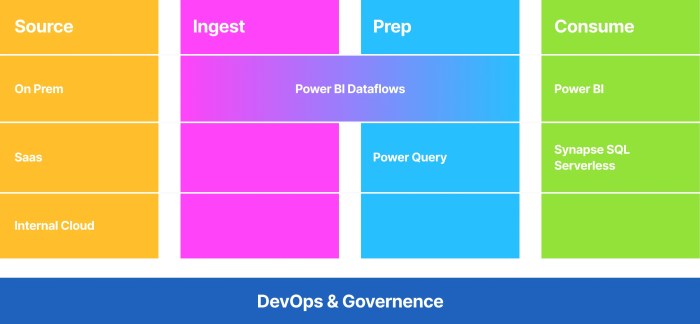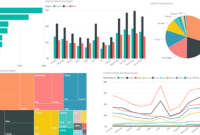BI for small business sets the stage for leveraging data to drive strategic decisions and achieve business growth. Dive into the world of Business Intelligence and discover how small businesses can harness its power.
Explore the key components and benefits of BI implementation tailored for small businesses, and uncover practical tips for optimizing BI solutions to meet specific business needs.
Overview of BI for Small Business

Business Intelligence (BI) refers to the use of technology, processes, and applications to analyze and interpret data to help organizations make informed decisions. For small businesses, BI plays a crucial role in providing valuable insights that can drive growth and efficiency. By leveraging BI tools, small businesses can access real-time data, identify trends, and make strategic decisions based on data-driven analysis.
Significance of BI for Small Business
BI tools enable small businesses to gather data from various sources, such as sales, marketing, and customer feedback, and consolidate it into actionable insights. By utilizing BI, small businesses can optimize operations, improve customer service, and identify new opportunities for growth.
- Improved Decision Making: BI tools allow small businesses to make informed decisions based on accurate data rather than relying on intuition or assumptions.
- Enhanced Performance Monitoring: Small businesses can track key performance indicators (KPIs) in real-time to assess the success of their strategies and make adjustments as needed.
- Competitive Advantage: By utilizing BI tools, small businesses can stay ahead of competitors by identifying market trends, understanding customer behavior, and making proactive decisions.
Common BI Tools for Small Businesses
Small businesses have a variety of BI tools at their disposal to help streamline processes and drive growth. Some commonly used BI tools include:
- Tableau: A data visualization tool that allows small businesses to create interactive and shareable dashboards to analyze data and gain insights.
- Google Analytics: A web analytics service that provides small businesses with valuable insights into website traffic, user behavior, and marketing effectiveness.
- Microsoft Power BI: A business analytics tool that enables small businesses to visualize and share insights from their data through interactive reports and dashboards.
Implementation of BI in Small Business

Implementing Business Intelligence (BI) in a small business can provide valuable insights and help in making informed decisions. Here are the key steps involved in implementing BI, along with a comparison of costs and benefits, and best practices for successful implementation.
Steps in Implementing BI in Small Business
- Assess Business Needs: Identify the key areas where BI can add value and align with business goals.
- Choose the Right BI Tool: Select a BI tool that fits the business requirements, considering factors like scalability, ease of use, and cost.
- Data Integration: Ensure seamless integration of data from various sources to generate accurate insights.
- Training and Adoption: Provide training to employees on how to use the BI tool effectively to maximize its benefits.
- Continuous Monitoring and Improvement: Regularly monitor BI performance and make necessary adjustments to improve outcomes.
Costs and Benefits of Implementing BI for Small Businesses
- Costs: Initial investment in BI tools, training costs, and ongoing maintenance expenses.
- Benefits: Improved decision-making, increased operational efficiency, better customer insights, and competitive advantage.
Best Practices for Successful BI Implementation in Small Business
- Start Small: Begin with a pilot project to test the BI tool before full implementation.
- Engage Stakeholders: Involve key stakeholders in the decision-making process and ensure their buy-in for successful implementation.
- Focus on Data Quality: Ensure data accuracy and reliability by maintaining data quality standards.
- Set Clear Objectives: Define clear objectives and key performance indicators to measure the success of BI implementation.
- Regularly Review and Refine: Continuously review BI processes and outcomes to refine strategies for better results.
Data Collection and Analysis for BI
When it comes to Business Intelligence (BI) for small businesses, data collection and analysis play a crucial role in driving informed decision-making and improving overall performance. By gathering and analyzing relevant data, small businesses can gain valuable insights that can help them identify trends, spot opportunities, and address challenges effectively.
Types of Data for BI, BI for small business
Small businesses should focus on collecting various types of data to leverage BI effectively:
- Customer data: Information on customer demographics, preferences, and behavior can help businesses tailor their products and services to meet customer needs.
- Financial data: Tracking revenue, expenses, and profit margins can provide insights into financial health and areas for improvement.
- Operational data: Monitoring processes, inventory levels, and supply chain efficiency can optimize operations and reduce costs.
- Market data: Analyzing market trends, competitors, and industry data can guide strategic planning and business growth.
Importance of Data Analysis in BI
Data analysis is essential in BI as it involves processing, interpreting, and visualizing data to extract meaningful insights. Without proper analysis, raw data remains just numbers without any actionable value. Through data analysis, small businesses can uncover patterns, trends, and correlations that can guide strategic decision-making and drive business growth.
Metrics for Small Business BI
Small businesses can track various metrics using BI tools to measure performance and make data-driven decisions:
- Sales performance: Monitoring sales revenue, conversion rates, and customer acquisition costs can help optimize sales strategies.
- Customer retention: Tracking customer churn rates, repeat purchase rates, and customer satisfaction scores can improve customer loyalty.
- Inventory management: Analyzing stock levels, turnover rates, and order fulfillment times can enhance inventory control and reduce waste.
- Website analytics: Examining website traffic, bounce rates, and conversion rates can optimize online marketing efforts and user experience.
Customizing BI Solutions for Small Business: BI For Small Business

Customizing business intelligence (BI) solutions is crucial for small businesses to effectively leverage data insights and make informed decisions tailored to their specific needs. By customizing BI tools, small businesses can optimize their operations, improve efficiency, and gain a competitive edge in the market.
Importance of Customization in BI Solutions
Customization in BI solutions allows small businesses to focus on key metrics and data points that are most relevant to their operations. By tailoring BI tools to their specific needs, businesses can avoid information overload and extract actionable insights that drive growth and profitability. Customization also ensures that the BI solution aligns with the unique goals and objectives of the business, leading to more targeted and impactful decision-making.
- Identify Key Performance Indicators (KPIs): Small businesses should identify the most critical KPIs that directly impact their success. By customizing BI tools to track and analyze these KPIs, businesses can gain a deeper understanding of their performance and make data-driven decisions.
- Personalize Dashboards and Reports: Tailoring dashboards and reports to display relevant information in a clear and concise manner is essential for small businesses. Customizing visuals, graphs, and charts can help stakeholders easily interpret data and take timely actions.
- Integrate Data Sources: Small businesses often have data spread across various systems and platforms. Customizing BI solutions to integrate data sources seamlessly can provide a comprehensive view of the business and facilitate more accurate analysis.
Tips for Tailoring BI Tools for Small Business
- Collaborate with Stakeholders: Involve key stakeholders in the customization process to ensure that the BI solution meets the specific requirements of different departments and functions within the organization.
- Regularly Review and Adjust: Continuously review and adjust the customization settings of BI tools based on evolving business needs and feedback from users. Flexibility is key to ensuring that the BI solution remains relevant and effective.
- Training and Support: Provide training and support to employees to maximize the benefits of customized BI solutions. Ensuring that users understand how to leverage the tools effectively can enhance adoption and utilization.
Enhancing BI Effectiveness through Customization
Customization can significantly enhance the effectiveness of BI in small businesses by:
- Improving Data Accuracy: Tailoring BI tools to capture and analyze specific data points can enhance the accuracy and relevance of insights generated.
- Increasing User Adoption: Customized BI solutions that align with user preferences and workflows can increase user adoption rates and promote a data-driven culture within the organization.
- Driving Competitive Advantage: By customizing BI tools to focus on unique business needs and market trends, small businesses can gain a competitive advantage and stay ahead of the competition.
In conclusion, BI for small business offers a transformative approach to data-driven decision-making, enabling companies to thrive in today’s competitive landscape. Embrace the power of BI and unlock the potential for success in your small business journey.
When it comes to making informed decisions, Business Intelligence tools play a crucial role in providing valuable insights. These tools help businesses analyze data effectively and efficiently, allowing them to make data-driven decisions based on real-time information. By utilizing BI solutions , organizations can optimize their operations and enhance their overall performance.
Businesses today rely heavily on data to drive their decision-making processes. With the help of data analytics and data-driven decisions , companies can gain a competitive edge by understanding market trends, customer behavior, and internal processes. By leveraging data effectively, organizations can make strategic decisions that lead to growth and success.




